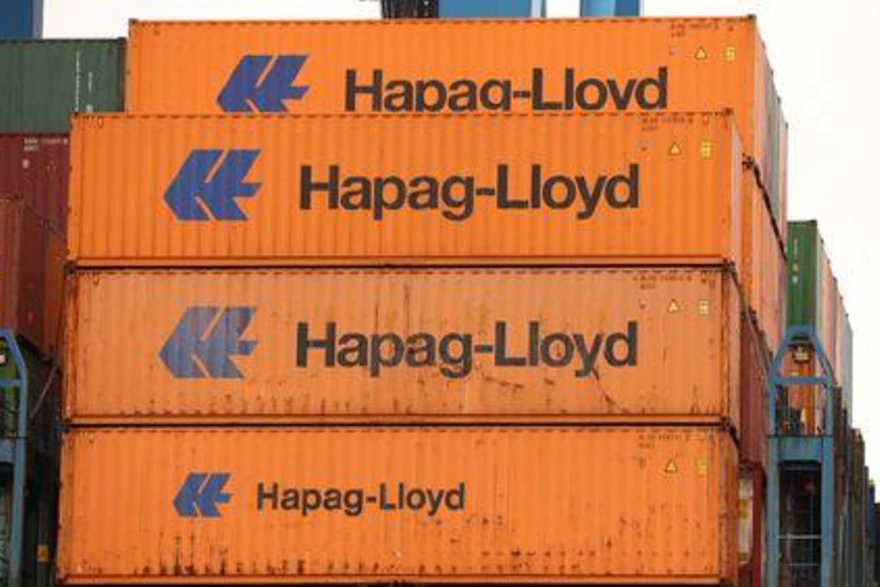FRANKFURT/ATHENS/LONDON/LOS ANGELES (Reuters) –Germany’s Hapag-Lloyd and Hong Kong’s OOCL said on Thursday they would avoid the Red Sea, the latest shipping companies to do so after attacks by Yemen’s Houthi group on vessels disrupted global trade, prompting the establishment of a naval task force.
The hostilities have put a chokehold on ship passages through the Suez Canal, which handles about 12% of worldwide trade. The Suez Canal is most vital to the movement of goods between Asia and Europe, but global logistics executives warned that sending ships on alternate routes could roil global supply chains, causing backups at ports and shortages of vessels, containers and equipment that are suddenly in the wrong place.
“The situation remains fluid, things could change quickly, which is why contingency plans that include a plan A, B and C are critical to keeping supply chains moving,” said Matthew Burgess, vice president of global ocean services at C.H. Robinson Worldwide.
Hapag-Lloyd said it would reroute 25 ships by the end of the year from the key waterway as freight rates and shipping stocks have increased because of the disruption. Avoiding the Red Sea and Suez Canal means following a far longer route around Africa.
The Iran-aligned Houthis, who control much of Yemen, have been attacking ships passing through the Bab al-Mandab Strait at the southern end of the Red Sea for weeks in what they say is a response to Israel’s war in Gaza.
Traders are meanwhile scrambling to find workarounds, including air flights, to get consumer goods to retailers, with journeys around Africa adding roughly 10-14 days extra to voyage times.
“Up to this moment, we have guided OOCL-operated vessels to either divert route or suspend sailing to Red Sea,” Hong Kong-headquartered container group OOCL told Reuters in a statement on Thursday, the first time it had confirmed pausing sailings.
A crisis at a single point in the supply chain can cause ships to bunch up, upending arrival and departure schedules at seaports and cascading delays throughout the system, said Christian Sur, executive vice president of ocean freight at Unique Logistics.
The cost to ship a container from China to the Mediterranean was up 44% in December alone to reach $2,413, due to the Red Sea disruptions, Freightos said earlier this week.
If the conflict persists or intensifies those so-called “spot” prices for cargo that isn’t under contract “could double or triple from current levels,” Sur said.
Global furniture seller IKEA is among the shippers warning of potential cargo delays and product shortages. Elsewhere, Finnish elevator maker Kone estimated that some shipments could be delayed by two to three weeks.
While goods that travel by container, including apparel, toys and food, are most at risk – other products are being affected.
U.S. soybean exporters, who were already switching shipments from the drought-stricken Panama Canal to the Suez Canal, are weighing whether to start putting crops on trains to the West Coast to access ships that go directly to China and other Asian markets to avoid significantly longer alternate voyages around South America or Africa.
“You’ve got all these imperfect options available,” Mike Steenhoek, executive director of the Soy Transportation Coalition.
Analysts warned that some retailers could start running low on some goods by February, though after the COVID-19 pandemic more companies have sought resilience in supply chains by buying from exporters in different regions.
“We are more experienced having gone thru COVID,” said Sur, whose firm counts retailers among its clients.
COALITION
Greece said on Thursday it would send a naval frigate to the area to help protect shipping as part of a multinational coalition announced by the United States to ensure safe passage through the waterway.
Greek ship-owners control about 20% of the world’s commercial vessels in terms of carrying capacity.
However, several countries the United States said would join the coalition have signalled they do not expect to send much naval power to the region while Saudi Arabia, which borders the Red Sea, was not listed as taking part.
The Houthi leader has meanwhile threatened to escalate attacks to include U.S. naval ships, raising the prospect of a wider conflict around the Bab al-Mandab strait.
A Hapag-Lloyd spokesperson said one of the company’s ships, the Al Jasrah, was attacked near Yemen on Dec. 15 on its way to Singapore and the company would take more decisions on routes by the end of the year.
The spokesperson said the company had received no detailed information about the U.S.-led naval coalition aimed at protecting Red Sea shipping.
Stabilising the critical waterways will be vital to ensure that shipping traffic can fully resume, ocean transportation executives said.
The fallout is also being felt directly in Israel. OCCL said on Saturday that “due to operational issues,” it would stop accepting cargo to and from Israel until further notice.
Israel’s most southern port of Eilat has seen an 85% drop in activity since Houthi attacks stepped up, the port’s chief executive said on Thursday.



